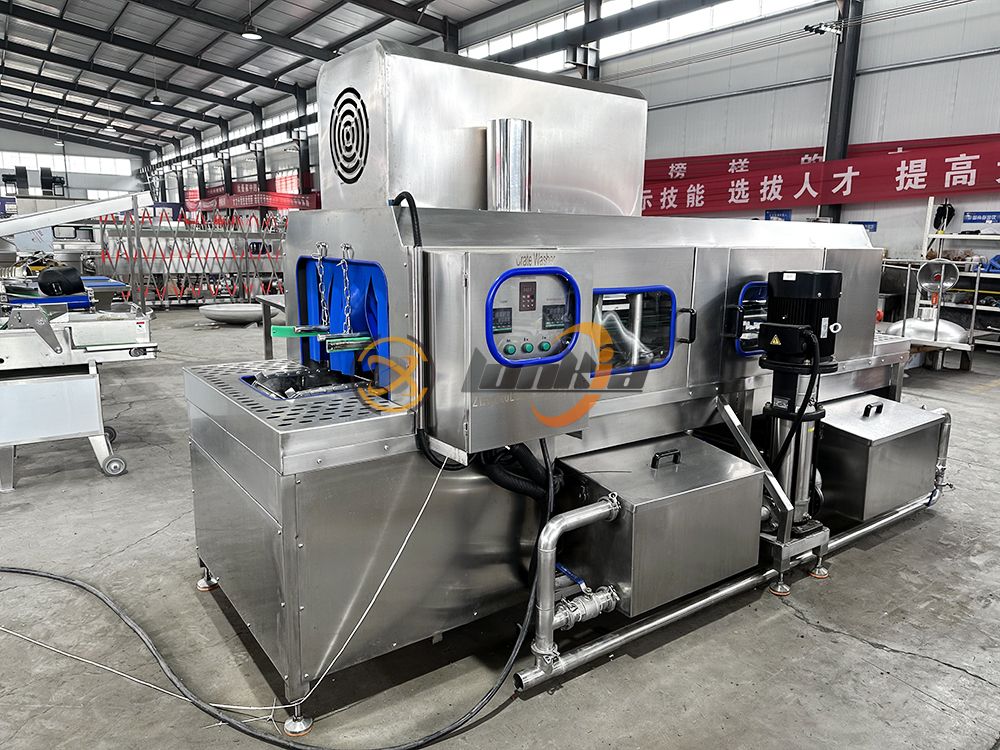Industrial cleaning is a critical part of maintaining hygiene and safety standards in many sectors, including food processing, logistics, and manufacturing. One of the most efficient ways to ensure consistent cleanliness is through the use of crate washers . These machines are designed specifically to clean crates, bins, and containers rapidly and effectively.

1. Enhanced Cleaning Efficiency
Crate washers are engineered to provide deep and thorough cleaning in a fraction of the time it would take with manual washing. High-pressure water jets, combined with powerful detergents, ensure that even the most stubborn residues are removed. The automated process guarantees that each crate is uniformly cleaned, reducing the risk of contamination and maintaining compliance with hygiene regulations.
The enhanced efficiency also allows for higher throughput, which is especially important in industries where large volumes of crates are handled daily. For example, in food processing plants, hundreds of crates are used to transport products. With a crate washer, the cleaning process is not only faster but also more reliable, ensuring that every crate is sanitized and ready for reuse without delay.
Additionally, the design of modern crate washers includes multi-stage cleaning, such as pre-wash, main wash, and rinse stages, which optimizes the removal of debris and contaminants. This multi-step process improves the overall cleanliness of crates, making them ideal for sensitive industries like pharmaceuticals and food logistics, where hygiene is non-negotiable.
2. Cost-Effective Solution
Although the initial investment for a crate washer may seem significant, the long-term savings are undeniable. Automated washing reduces labor costs by minimizing the need for manual scrubbing. Additionally, the efficient water circulation systems in most crate washers optimize water usage, which lowers utility costs. Over time, these savings can easily outweigh the upfront costs, making it a smart investment for industrial operations.
Moreover, crate washers extend the lifespan of crates by preventing damage caused by abrasive manual cleaning. This means businesses save on replacement costs and maintenance, further improving cost efficiency. For large-scale operations, this translates to thousands of dollars saved annually.
Consider the example of a large-scale food distributor that handles over 10,000 crates weekly. Switching to automated crate washers reduced their water consumption by 30% and cut labor costs in half, leading to annual savings of over $50,000. Such savings significantly contribute to improving profit margins while maintaining stringent hygiene standards.
For businesses aiming for sustainability, the water-saving technology of modern crate washers also helps reduce the overall environmental impact, aligning with global goals for water conservation and responsible resource management.
3. Consistent Cleaning Results
One of the main challenges of manual crate washing is inconsistency. Human error, fatigue, and varying levels of attention can result in uneven cleaning. Crate washers eliminate this variability by providing a standardized cleaning process. Every cycle is programmed to perform the same thorough wash, ensuring that each crate is sanitized to the same high standard. This consistency is crucial for industries like food processing, where contamination risks must be minimized.
In logistics and supply chain operations, clean and consistently washed crates prevent cross-contamination during transportation. This not only protects products but also meets the strict health and safety standards required in regulated industries. A well-cleaned crate reduces the risk of product recalls and strengthens consumer confidence in brand reliability.
Furthermore, automated crate washers often include quality control features that monitor water temperature, pressure, and detergent levels, ensuring that every cleaning cycle meets industry standards.
4. Reduced Labor Requirements
Manual crate washing is not only labor-intensive but also time-consuming. By integrating crate washers into the cleaning process, companies can drastically reduce the number of workers required for this task. This allows staff to focus on more critical operations, boosting overall productivity and reducing physical strain on employees.
The reduction in manual labor also lowers the risk of workplace injuries associated with repetitive tasks. For businesses aiming to improve employee well-being and safety, this is a major advantage. Additionally, with fewer employees dedicated to washing tasks, businesses can reallocate human resources to higher-value roles, enhancing both efficiency and job satisfaction.
5. Eco-Friendly and Water-Saving Technology
Modern crate washers are designed with sustainability in mind. Advanced water filtration and recycling systems allow these machines to use significantly less water compared to traditional cleaning methods. Additionally, many models are energy-efficient, reducing both water and power consumption. This not only helps the environment but also lowers operational costs for businesses committed to green practices.
Some advanced models even come with features like heat recovery systems, which further optimize energy usage. For companies focused on sustainable practices, crate washers align well with green initiatives and environmental compliance standards. Leading manufacturers have begun integrating IoT technology to monitor water and energy consumption in real-time, allowing for precise adjustments that further minimize environmental impact.
By reducing waste and conserving water, businesses that adopt crate washers contribute to broader environmental goals, enhancing their reputation as responsible and sustainable operations.
Incorporating crate washers into your industrial cleaning routine provides numerous benefits, including enhanced efficiency, cost savings, consistent results, reduced labor, and environmental sustainability. For industries that prioritize cleanliness and productivity, investing in high-quality crate washers is a strategic move that pays off in both the short and long term.
By leveraging the power of automated cleaning, businesses can maintain higher standards of hygiene, cut down on manual labor, and contribute to sustainable practices, all while ensuring that their crates are spotless and ready for reuse.
Overall, crate washers represent a step forward in industrial cleaning technology, offering a blend of performance, cost-effectiveness, and environmental responsibility that manual cleaning simply cannot match. Adopting this technology is not just an upgrade in operations—it is a commitment to efficiency, sustainability, and long-term growth.

